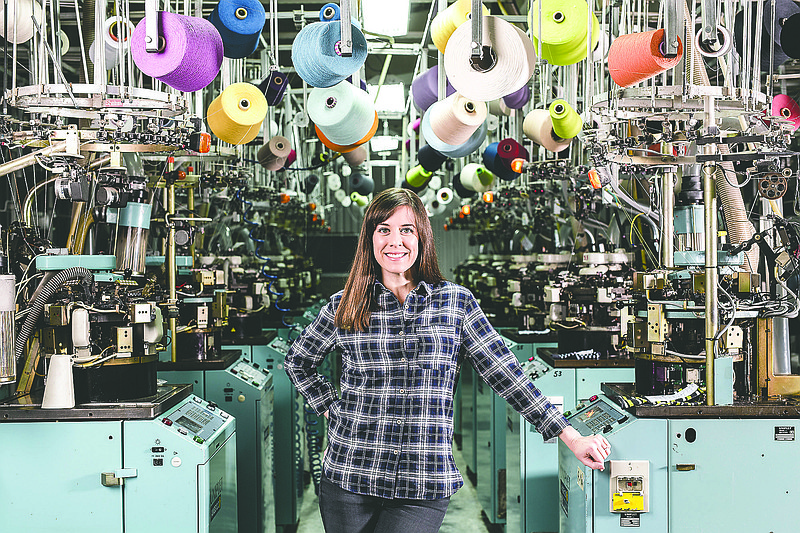FORT PAYNE, Ala. - Inside a squat metal building on the outskirts of Fort Payne, Ala., huge spools of cheerfully colored thread hang like nursery mobiles above rows of blue knitting machines the size of office copiers.
It's loud in this part of the mill, and Gina Locklear has to shout to be heard. Her eyes light up as she talks about her newest set of machines, installed last January, that can knit a sock with a seamless toe. It's a capability the mill's older machines don't have. Those were originally built to manufacture white athletic socks, a business that has largely left the country.
She watches as a circular bit of machinery lined with 144 needles knits an aqua toe on a coral-and-gray striped sock. The machine spits the finished sock into a bin filled with identical socks.
"The sock is knitted and the toe is closed all on one machine," she says proudly. "No bumpy seams.
"I've wanted this machine ever since I started."
By all accounts it's been a big year for Locklear. National recognition from the likes of Martha Stewart and The New York Times has helped boost her sock business to the point where she could invest in new machinery and open her very first storefront.
The 37-year-old Fort Payne native has an unlikely origin story, earning the nickname Sock Queen of Alabama in a town that can no longer claim the title of Sock Capital of the World.
Locklear's sock business, and her hometown, have come a long way in the decade since the area's once-booming hosiery industry cratered just after the turn of the 21st century. In the absence of large-scale manufacturing opportunities, Locklear has found success in a smaller, nimbler operation that prioritizes quality over quantity.
"We're very small, we don't have a ton of employees, but my hope is that we grow and hire more and more people who were in the hosiery business before," said Locklear. Her company, zkano, is named after a Native American word that loosely translates as a state of being good.
"We really identify with that philosophy, making our socks here in our family mill in Fort Payne, Alabama."
Just west of downtown Fort Payne sits Airport Road.
When Fort Payne was The Sock Capital of the World, Airport Road was its Main Street, a bustling manufacturing thoroughfare lined with most of the hosiery mills that employed half of the town's roughly 14,000 residents.
When Gina Locklear thinks about the changes in Fort Payne from its sock-capital heyday, she thinks about Airport Road.
Her parents, Terry and Regina, opened their mill in 1991 when Locklear was 12 years old. Emi-G Knitting, named for Locklear and her sister Emily, sits about halfway along the road, one of the few mills still operating today.
"The energy that was here when all the sock mills were up and running is no longer here," said Locklear. "The town is doing fine economically, and there are a lot of big industries here that employ people.
"But for people like us, socks were - are - our life. It's different.
"Things just feel more quiet, I suppose."
In the year 2000, nearly 8,000 people worked at 125 hosiery mills in the area. More than half of America's socks were made in Fort Payne, according to city leaders.
Yet over the next decade, everything changed.
Corporate outsourcing to cheap labor overseas devastated the town as mills lost contracts and closed, seemingly overnight. By 2009, unemployment in DeKalb County was at 15.3 percent.
By 2011, there were only about 20 mills left in Fort Payne.
Locklear watched as her friends and neighbors lost their means of supporting their families. She saw her hometown lose its identity. It made her mad.
She was also dissatisfied with her real estate job. So in 2007 she approached her parents, who had managed to keep their mill open by running a skeleton crew, with the idea to start a line of organic socks.
They were skeptical. But she was determined, and the zkano sock brand was born in 2008, followed in 2013 by a high-end specialty line she named Little River Sock Mill.
Over the next two years, Locklear's socks garnered national attention and the company continued to add new styles and patterns to keep pace with demand. Her socks are sold in more than 240 specialty boutiques around the country, as well as online at zkano.com and LittleRiverSockMill.com.
People started showing up at the little mill on Airport Road, wanting to buy socks in person. Many were from other states, stopping in the area to explore outdoor tourist attractions like the Little River Canyon Natural Preserve and DeSoto State Park.
"We really just didn't have any kind of retail experience to offer all these people, and we wanted to give them a nice place to shop and see our socks, but also see who's behind our socks," said Locklear.
In November she opened The Mill Shop, a modern showroom at the front of the mill, lined floor to ceiling with socks from the zkano and Little River Sock Mill lines.
"I love the idea of our Mill Shop because not only are you buying a product," she said, "but you're buying it just a few steps from where it's made, and buying it from the people on our team who are involved in our process."
An aqua-colored Dutch door separates The Mill Shop showroom from the part of the mill where socks are finished, warehoused, inspected, packaged and shipped.
Beyond the door, Rhonda Whitmire works at a table, packaging online orders of socks.
Whitmire is a lifelong Fort Payne resident. She worked nearly three decades in a hosiery mill before she was let go. About four years ago, Locklear hired her at zkano.
Whitmire said that for her and others like her, the loss of the mills still hurts.
"I think it's more of an acceptance than a recovery," she said. "It's been rough on some. Some have gone back to school or found jobs elsewhere or moved away.
"Even now, it bothers me," she said. "I worked for (her previous employer) for 27 years. You develop relationships. My coworkers were like family and (when the mills closed) you'd never see some of those people again. You wonder how they're doing, if they're OK."
She wants to see the hosiery industry come back because Fort Payne "is a town with a lot of potential. It's got a lot of good people in it. With the right motivation, it could really take off."
The economy in Fort Payne is evolving.
The unemployment rate county-wide is the lowest it's been in years, at 3.5 percent, right around the state average. The biggest local employer is The Children's Place, a children's clothing retailer that operates a large warehouse and distribution site on Airport Road and employs more than 700 people.
These days, several manufacturing companies along Airport Road have large "We're hiring" banners out front. There are 14 hosiery mills still operating in Fort Payne, according to the DeKalb County Economic Development Authority, employing around 830 people total.
Whitmire is excited about the opening of The Mill Shop. It's a sign to her that the sock business is, if not booming, at least profitable.
"We're going to be positive and move forward," she said. "We've got a good product here, and that makes me feel good."
Locklear hopes The Mill Shop could help pull in tourists to the area as the town shifts its focus from strictly manufacturing to becoming an outdoor tourism destination.
"One hope I had is that it might convince people to come to Fort Payne and check out what we have to offer," she said. "Go downtown and grab a burger, and check out the stores down there, then go up to the Little River Canyon and see how beautiful that is."
Her business just celebrated its eighth birthday, and Locklear hopes to keep growing. The number of employees fluctuates because she often shares them with her parents' mill. She employs between eight and 30 people throughout the year.
"The thing is you have to - and I think a lot of the other mills have done this, too - you've got to do something different than the type of socks that Fort Payne was known for back in those days," she said. Those were the basic athletic socks that the mills would knit, package and ship in huge quantities.
"Now we have to source our own yarn, we design all of our socks, program all of our machines," she said. "And in addition to making everything here, we now have to figure out how to sell it, too. It's just a different business.
"You've got to specialize to stay in it," he said. "I think if you do that, the business is there."

